
Eleven (11) Sectors II: Sector Commanders of Bangladesh
Last updated: 5 October 2017 From the section 1971 Muktijuddho
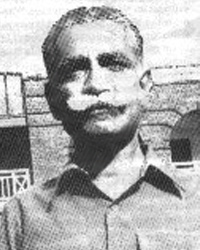
Muhammad Ataul Ghani (M. A. G.) Osmani
(1 Sept 1918 - 16 Feb 1984)
Commander-in-Chief (C-in-C) of Bangladesh Forces during the Bangladesh Liberation War of 1971. Popularly referred to as 'Bongabir' (Brave Bengali) General Osmani. Bangladesh Forces (military, air and navy) formed under his command. Fought in WWII in Burma for British Indian Army (1939-1947). Shifted to Pakistani Army after 1947 partition and became a Colonel. Fought internally with superiors for rights of Bengali soliders. Joined Awami League and was elected MNA in the 1970 Pakistan general elections from Sylhet. Retired in April 1972 as the first full General (four star) of Bangladesh Forces, which was replaced by Bangladesh Army, Bangladesh Navy and Bangladesh Air Force and three separate chiefs were selected. Thus 'General MAG Osmani' is the only historical name whose name appears first in the honour boards of the three services as C-in-C between 12 April 1971 to 7 April 1972. Controversially joined Khondaker Moshtaque Ahmed's cabinet as Defence Advisor after Sheikh Mujib's murder in 15 August 1975. Formed Jatiya Janata Party (1977-1984) and stood unsuccessfully against Ziaur Rahman for presidentship in 1978. Sylhet's Osmani International Airport (Osmani Antorjatik Biman Bondor), state-run hospital Sylhet Osmani Medical College and Hospital (popularly referred to as Osmani Hospital), Sylhet (MAG Osmani) Stadium, and (Osmani) Shishu Udyan named after him. Born in Dayamir, Sylhet. Died as a bachelor, aged 66, on 16 February 1984 in St Bartholomew's Hospital, London, whilst receiving treatment for cancer. Buried next to mother in Shah Jalal Dargah, Sylhet with full military honours.
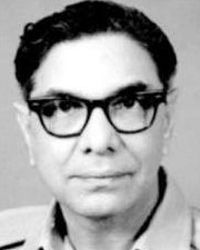
Mohammad Abdur (M. A.) Rab
(1 Jan 1919 - 14 Nov 1975)
Bir Uttom. Assistant Commander-in-Chief of Liberation war and first Army Chief of Bangladesh. Founded the Muktijoddha Kalyan Trust and ran it successfully for years. Former MP. Chairman of the governing body of International Medical College. Born in village of Khagaura, Baniachang thana, Sylhet. Died a bachelor on 14 November 1975 at the Combined Military Hospital, Dhaka, after suffering from ailments including anemia. Buried in his village of Umednagar on the banks of Khowai River in Habiganj.
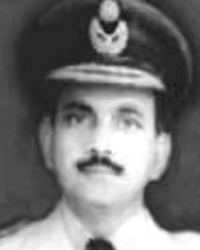
Abdul Karim (A. K.) Khandker
(Born 1930)
Bir Uttam. Deputy Chief of Staff (DCOS) of Bangladesh Armed Forces during 1971 Liberation War. Born in Pabna. Parents Khandker Abdul Latif and Arefa Khatun. Completed matriculation (1947), ISC (1949), degree from Pakistan Air Force College (Sept 1952) and PSA from Pakistan Air Force Staff College (1965). Began career as GD Pilot (1951) and served in Fighter Squadron till 1955 and became Flying Instructor. Flight Commander at Flying Instructors' School till 1958 and at Jet Fighter Conversion Squadron till 1960. Squadron Commander at PAF Academy till 1961, Squadron Commander of Jet Fighter Conversion Squadron till 1965, and Officer Commanding of Training wing at PAF Academy in 1966. Became PSA (1965) from PAF Staff College, and President of PAF Planning Board (1966 - 69). Posted at Dhaka as Second-in-Command of PAF Base in 1969. Defected with fellow Bengali officers and joined Bangladesh forces in May 1971. Appointed DCOS in July 1971 and given responsibility of operation and training. Established first ever Bangladesh Biman Bahini (Air Force) in Dimapur, Nagaland, India, and carried out air attacks against Pak forces. Represented Bangladesh in surrender ceremony in Dhaka on 16 Dec 1971. Awarded 'Bir Uttam' gallantry award in 1972 and appointed Chief of Air Staff (1972 - 75). Stepped down as protest mark following Sheikh Mujibur Rahman's killing in 1975 after pledging support to Khandaker Moshtaque Ahmed along with other service chiefs. Established and became chairman (2001 - 06) of "Sector Commanders Forum" for Sector and Sub-Sector Commanders of Liberation War. Awarded Swadhinata Purushkar (Independence Award) in 2011. Appointed Bangladesh High Commissioner in Australia (1976 - 82) and India (1982 - 86), Adviser to President, and later Planning Minister (1990). Elected member of parliament (1998 & 2009) from Pabna–2 constituency (Sujanagar Upazila). Inducted as full cabinet minister in 2009 and appointed Planning Minister of Government of Bangladesh. Caused controversy in 2014 with his book "1971 Bhetore Baire" (1971: Inside and Outside) where he claimed Sheikh Mujib ended his historic 7 March 1971 speech with "Joy Pakistan" (Long live Pakistan), and that only members of Awami League party were initially recruited for guerrilla war and other suitable youths not belonging to that party were rejected. Resigned from Sector Commanders Forum as response. But declared as a persona non grata in Gazipur district and pro-government lawyers, mainly from Awami League, demanded withdrawal of all of his titles. Has wife, two sons and one daughter.

A. R. Chowdhury
()
Assistant Chief of Staff (ACOS)
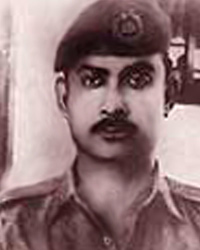
Ziaur Rahman
(1936 - 1981)
7th President of Bangladesh. Founder of BNP. Bir Uttom (1972) awarded by Sheikh Mujib after independence. Popularly referred to as 'Shohid' (Martyred) Zia. Awarded Hilal-i-Jur'at (Crescent of Courage), second highest military award, by Pakistan government for bravery in Indo-Pakistani War of 1965. Sector 2 (Chotrogram) & Sector 11 (Mymensingh-Tangail) and 'Z-Force' Commander during Swadhinata Juddho. Declarer of Bangladesh independence (Swadhinata Gushok) on 26 March 1971 on behalf of Sheikh Mujib. Released from house arrest by Colonel Abu Taher during Sipahi-Janata Biplob of 7 November 1975. Inserted 'Bismillah' into Constitution of Bangladesh and controversially legalised Indemnity Act protecting killers of Sheikh Mujib and 4 Awami League leaders. Wife Khaleda Zia, first female PM of Bangladesh, been leading the BNP since his death. Assassinated on 30 May 1981 in Chittagong Circuit House allegedly by Major General Abul Manzoor, Bir Uttom and Sector 8 (Jessore) Commander. Buried next to Jatiyo Sangshad Bhaban in Chondrima Udyan (aka Zia Udyan).
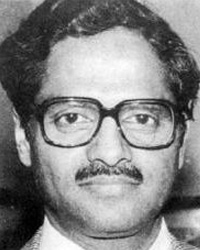
Rafiqul Islam
()
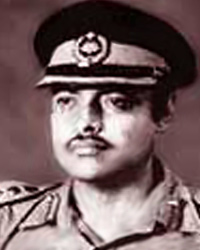
Khaled Mosharraf
(1 Nov 1937 - 7 Nov 1975)
Sector 2 (Comilla-Noakhali) Commander during 1971 Swadhinata Juddho. Born in Mosharrafganj village, Islampur upazila, Jamalpur district, Mymensingh division. Parents Mosharraf Hossain, a jute merchant, adn Jamila Akhtar. Educated at Islampur High School and Mymensingh Zila School and passed matriculation from Cox's Bazar High School (1953) and IA from Dhaka College (1955). Enrolled at Pakistan Military Academy in Kakul and obtained commission in army in 1957. Received 8 years military training in various training institutes. Appointed Adjutant of 4th East Bengal Regiment (EBR) during 1965 Indo-Pak War. Joined Kakul Military Academy as an instructor immediatly afterwar. Graduated from Kakul Military Academy and promoted to Major. Obtained PSC degree from Command and Staff College, Quetta (1968) and appointed Brigade Major of 57-Brigade at Kharia. Transferred to Dhaka in March 1970 when he had opportunity to get military training in West Germany and later in London. Put in charge of 4th EBR in Comilla cantonment on 24 March 1971. Secretly seceded to Brahmanbaria on 27 March 1971 following outbreak of war. Appointed Sector 2 Commander and chief of K-Force (named after him). Promoted to Lieutenant Colonel. Wounded by a bullet shot on his head (23 Oct 1971) and recovered after a long treatment at the military hospital in Lukhnow, India. After independence, appointed Staff Officer at Dhaka army headquarters. Promoted to Brigadier then Chief of General Staff of Bangladesh Army. Awarded 'Bir Uttam' (1972). Led military coup on 3 Nov 1975 along with Lt. Col. A. T. M. Haider and Col. Nazmul Huda following assassination of Sheikh Mujib and family. But killed in counter coup 4 days later - and 6 days after his 38th birthday - in Dhaka cantonment. Left behind wife Salma and daughter Mahjabeen, who became an MP.
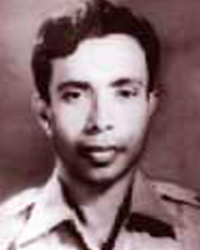
Abu Taher Mohammad (A. T. M.) Haider
(12 Jan 1942 - 7 Nov 1975)
Bir Uttam. Sector 2 (Comilla - Noakhali) Commander during 1971 Liberation War. Born in Bhabanipur, Kolkata, India. Father Mohammad Israil was a police officer and later a lawyer in Kishoreganj bar. Mother Hakimun Nesa. Educated at Binapani Primary School, Pabna, passed matriculation from Ramananda Government High School (1958), IA from Gurudayal College of Kisoreganj (1961), and obtained BSc degree from Lahore Islamia College (1965). Completed MSc Part I in Statistics from Punjab University (1966) and joined Pakistan Army as commissioned officer. Undertook training from Pak military academy of Kakul and served as an officer in artillery forces. Received guerrilla training on Special Service Group (SSG) in Cherat, then posted at Multan Cantonment and continued there till 1969. Made captain (9 Sept 1970) and posted at third battalion in Comilla Cantonment, East Pakistan. Transferred to Dhaka on January 1971 and later transferred back to Comilla Cantonment. Left Pak Army on 27 March 1971 and fought in Liberation War as Second-in-Command to Khaled Mosharraf and his K-Force, and trained 'Crack Platoon' students on explosives. Was present at Instrument of Surrender in Racecourse Maidan, Dhaka, on 16 December 1971. Joined as commander after formation of 13 EBR (1972) and promoted to Major. Awarded 'Bir Uttam' honour by Government of Bangladesh on 15 Dec 1973. Promoted to Lt. Colonel (1974) and joined Chittagong Cantonment. Shifted to Ruma Cantonment on 21 October 1975. Led military coup along with Khaled Mosharraf and Col. Nazmul Huda against Khandaker Moshtaque Ahmed government on 3 Nov 1975. Assassinated 4 days later with Khaled Mosharraf in Dhaka Cantonment by a coup led by Col. Abu Taher, former Sector 11 Commander. He was only 33. His dead body recovered on 11 Nov 1975 and buried at his village in Kishoreganj.
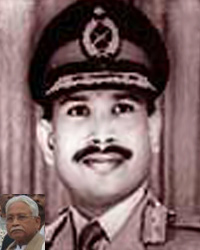
Kazi Mohammad (K. M.) Shafiullah
(Born 2 Sept 1934)
Bir Uttam. Sector 3 (Brahmanbaria and parts of Sylhet) Commander during 1971 Liberation War and former Chief of Army Staff of Bangladesh Army. Born in Rupganj, near Dhaka, to family of 7 children, 3 brothers (he was number 2) and 4 sisters. Studied in affluent school in village where he was one of the few Muslim boys along with his elder brother. Passed matriculation (1950) then IA from Haraganga College, Munshiganj (1952). Joined Pakistan Army in Quetta (1953), then Kakul. Commissioned as officer in Punjab Regiment (1955 - 57), then transferred to East Bengal Regiment (EBR). First staff appointment was in Rawalpindi Army Headquarters as military secretary for 2 years, then returned as instructor in Quetta. Joined 2 EBR in 1969 till Liberation War broke out. Second-in-Command of 2 EBR in Joydevpur which led first Bengali officer rebellion on 19 March 1971. Sector 3 Commander and S-Force (named after him) Brigade Commander during 1971 Muktijuddho. Present at surrender ceremony in Racecourse maidan, Dhaka on 16 Dec 1971. Awarded 'Bir Uttam'. Chief of Army Staff (COAS) of Bangladesh Army (7 Apr 1972 - 25 Aug 1975). Criticised by pro-Mujib supporters for lack of action during Sheikh Mujib's assassination. Forced to retire from army and given overseas ambassadorial post by Khandaker Moshtaque government. Continued overseas role for 17 years and resigned in 1991. Elected Awami League member of parliament in 1996. Joined Sector Commanders Forum and appointed chairman (2014). Has wife, a son and 3 daughters.
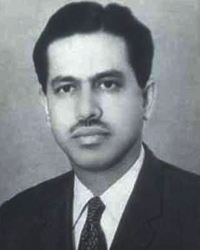
A. N. M. Nuruzzaman
(Dec 1938 - 16 Mar 1993)
Bir Uttam. Sector 3 (Brahmanbaria and parts of Sylhet) Commander during 1971 Sangram. Born in Saidabad village, Raipur thana, Narsingdi district. Parents Abu Ahmad, a government official, and Lutfunnesa. Father's job meant he studied in various places during early years, including Madinapur Islamic High School, Comilla Yusuf School, and Sherpur Victoria Academy. Passed matriculation from Sunamganj High School and IA from M. C. (Murari Chand) College, Sylhet. Obtained degree in History from Dhaka University (1959). Athletic Secretary of Salimullah Muslim Hall and regular football player of Ispahani Sporting Club in first division league in Dhaka as well as a keen tennis player. While a student in MA class he joined graduation course in Pakistan Military Academy. Commissioned in Pakistan army as second lieutenant in October 1960. Had posting in Jessore, Dhaka and Chittagong cantonment and promoted to Captain. Transferred to Quetta, West Pakistan in 1968. Detained in Agartala Conspiracy Case but released (1969) and reinstated in army. Joined Bangladesh Forces in 1971 and appointed Sector 3 Commander in September 1971, taking over from K. M. Shafiullah who was commanding S-Force then. Promoted to Brigadier General in Bangladesh Army. First and only director general of Jatiyo Rakkhi Bahini (Mar 1972 - Aug 1975) who was on a visit to London when Sheikh Mujib assassinated on 15 August 1975. Awarded 'Bir Uttam'. After 1975 his service placed under the Ministry of Foreign Affairs, and performed diplomatic responsibilities in Australia, Philipines, Senegal, Canada and Sweden. Died on 16 March 1993, aged 54, at Stockholm while working as ambassador of Bangladesh to Sweden. A road in Shyamoli area of Dhaka named after him 'Bir Uttam ANM Nuruzzaman Sarak'.
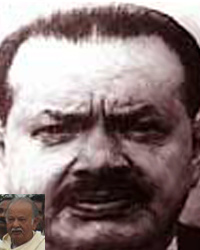
Chitta Rajan (C. R.) Dutta
(Born 1 Jan 1927)
Bir Uttom. Sector 4 (Habiganj area, Sylhet) Commander during 1971 Mukhtijuddho. Born in Shillong, Assam, India but ancestral home is village of Mirashi, Chunarughat upazilla, Habiganj, Sylhet. Parents Upendra Chandra Dutta, a police officer and Labonno Prova. Began education in Class Two in Laban Government High School, Shillong, and later at Habiganj Government High School. Went to Daulatpur College, Khulna, as father against him going to Kolkata even though he was admitted to Ashutosh College, Calcutta. Gained BSc degree and joined Pakistan Army (1951). Promoted to Second Lieutenant and fought in Indo-Pak War of 1965 as commander in Asalang and rewarded for his valour. Came to family home in Habiganj, East Pakistan in 1971 to spend 3 months vacation and participated in Liberation War as Sector 4 Commander. Following independence, joined Bangladesh Army as Brigade Commander in Rangpur (1972) and given responsibility in 1973 of creating a new border force. Became first Director-General of Bangladesh Rifles (present-day Border Guards Bangladesh). Awarded 'Bir Uttam' by Sheikh Mujib government on 15 Dec 1973. Chairman of Muktijuddha Kollan Trust (Freedom Fighters Welfare Association) (1977) and BRTC (1979). Retired in 1984. Formed the Sector Commanders Forum with other prominent members from Bangladesh Liberation War. Founder and president of Bangladesh Hindu Buddhist Christian Oikkyo Parishad (Bangladesh Hindu Buddhist Christian Unity Council or BHBCUC). In Dhaka, road from Sonargaon crossing to Kataban mosque named after him 'Bir Uttam C. R. Dutta Sarak' (Bir Uttam C. R. Dutta Road). Has wife, son and daughters.
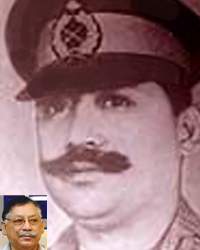
Mir Shawkat Ali
(9 Dec 1936 - 20 Nov 2010)
Bir Uttam. Sector 5 (Durgapur-Danki area of Sylhet) Commander during 1971 Sangram and politician. Born in Nazira Bazar, Dhaka. Educated at Mahuttuli Free Primary School, Dhaka, passed matriculation from Armanitola Government High School (1953) and ISc from Dhaka College (1955). Joined Pakistan Military Academy as cadet, obtained BSc degree (1958), commissioned in army, and joined 2nd East Bengal Regiment (EBR) in 1958. From 1955 - 1966 worked at different regiments as Adjutant, Quarter Master, Company Commander and in military intelligence department. Fought in 1965 Indo-Pak War in Rangpur border. Obtained PSC degree from Command and Staff College, Quetta (1971) and joined 8th EBR at Chittagong. Second-in-Command of 8th EBR, led by Major (later President) Ziaur Rahman, during Bengali officers revolt on 25 March 1971. Sector 5 Commander during independence war. Promoted to Lieutenant Colonel at last week of August 1971. Awarded 'Bir Uttam'. From 1972 - 1974 formed Infantry Brigade in Chittagong and served as Brigade Commander. Commander of other Brigade from 1974 - 1975. Led Bangladesh army delegation to Cairo, Egypt in 1974. Chief of General Staff of Bangladesh Army (1975), and chairman of Old Dhaka Development Committee and of Bangladesh Football Federation (1975 - 77). Same time given charge of Martial Law Administrator of Dhaka region. Appointed as Principal Staff Officer of the Bangladesh Army (1980 - 81). Retired from army on 9 June 1981 as Lieutenant General and became Bangladesh High Commissioner to Egypt, Sudan, Germany, Australia, United Kingdom and Portugal. Resigned in 1988 in protest against dictatorship of military ruler Hussain Ershad. Joined Bangladesh Nationalist Party (BNP) as president of Dhaka city unit and elected member of Jatiya Sangsad (1991) from Lalbagh (Dhaka) constituency. Included in cabinet as state minister in charge of the Ministry of Food, and later Ministry of Labour and Manpower. Vice-chairman of the national executive committee of BNP and vice president of Sector Commanders Forum (2007). Retired from active politics in 2007. Honoured with President's Award twice for contribution towards sports and agriculture. Wrote 3 volumes long autobiography 'The Evidence' (2008). Died alone after prolonged illness and heart failure on 20 Nov 2010 at home in Gulshan, Dhaka, as wife and 3 daughters lived in London, UK, for last 15 years. Buried in Banani Armed Forces Graveyard, Dhaka. Road in Gulshan area of Dhaka named after him 'Bir Uttam Mir Shawkat Ali Sarak'.
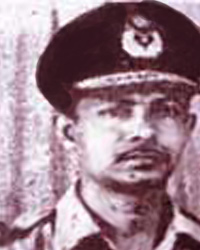
(Mohammad) Khademul Bashar
(1 Sept 1935 - 1 Sept 1976)
Sector 6 (Rangpur) Commander during 1971 Sangram. Chief of Bangladesh Air Force. Born in Bogra. Passed matriculation from Satkhira Prananath High School and ISc from Rajshahi College. Joined Pakistan Air Force as cadet (1953), graduated from Military Academy and joined Fighter squadron. Transfered to newly established Bombing squadron of PAF (1960) and in command of it from 1969 - 70. He was then the only Bengali holding such position. Honoured with Flying Proficiency Badge (1969), and invested with the insignia of TBT for his extraordinary performance in Air Force. Promoted to Wing Commander (1970) and in command of a Radar squadron in Dhaka. Joined 1971 Sangram and, though air force officer, deputed to command land force in districts of Rangpur and Dinajpur (Sector 6). He and M. Hamidullah Khan were only two BAF officers appointed as Sector Commander during war. Following independence, appointed Brigde Commander in Rangpur and promoted to Group Captain (Feb 1972). Returned to Bangladesh Air Force (BAF) service in July 1972 and posted as Lieutenant in BAF Dhaka Base. Promoted to rank of Air Commodore (Oct 1973) and appointed Deputy Chief of Air Staff in charge of operation and training. Appointed Chief of Air Staff in 1 May 1976. Made Air Vice Marshal (3 May 1976) and appointed Deputy Chief Martial Law Administrator in charge of the Ministries of Petroleum, Food and Civil Aviation, and Department of Tourism. Awarded 'Bir Uttam' honour. Died 1 September 1976 - on his 41st birthday - in a plane crash while piloting an inaugural flight on occasion of the opening of Flying Instructors School at BAF Dhaka Base. Squadron Leader Mofijul Haque also died in the same plane accident. Buried in Kurmitola, northern Dhaka. Dhaka Base was subsequently renamed after him as 'BAF Bashar Base'.

Nazrul Huq
()

Qauzi Nooruzzaman
(24 March 1925 - 6 May 2011)
Commander of Sector 7 (Rajshahi-Pabna). Parents Khan Sahib Sadrullah and Ratubunnesa. Studied Chemistry at St. Xavier's College, Calcutta. Joined British Indian Navy (1943), against father's wishes. Transferred to army, at the call of Jawaharlal Nehru. Joined Pakistan Army after 1947 Partition. Received advance training at Royal Artillery School (1949), England, and returned to Pakistan and posted to Jhelun sector in Kashmir War. Teacher at Cadet Training School (1950). Promoted to Major in 1956. Retired voluntarily from army in 1962 and turned to business. Mingled with progressive thinkers, writers and other intellectuals. Wrote regular columns in various periodicals against colonialism and imperialism. Come out of retirement, two days after his 46th birthday. Sent his family to a village of Gandhina, Mymensingh district, and tried to to join Major Shafiullah's battalion. But made sector commander in July by Col. Osmani. Founder of Ghatak Dalal Nirmul Committee, against collaborators and traitors of 1971. Worked to raise awareness of Liberation War. Editor of weekly 'Nova Pododdhoni', and lead editor of 'Ekattorer Ghatok o Dalalra Ke Kothay' (hereabouts of the Traitors and Collaborators of '71). Wrote books including 'Muktijuddho o rajniti', 'Bangladesher samaj o rajniti', 'Swadesh chinta', and his famous 'A Sector Commander Remembers Bangladesh Liberation War 1971' (2011). Awarded Bir Uttam state honour but declined as he believed Liberation War was people's war and gallantry awards are given to paid soldiers. Passed away on 6 May 2011, aged 86. 'Quazi Nooruzzaman Trust' founded in his honour.
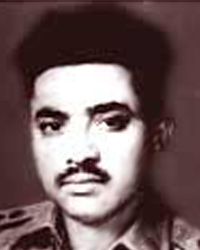
Abu Osman Chowdhury
()
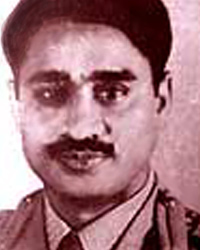
M. A. Manzoor
()
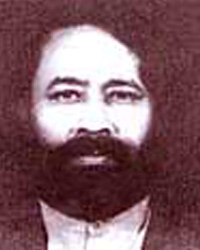
M. A. Jalil
()

Joynal Abedin
()
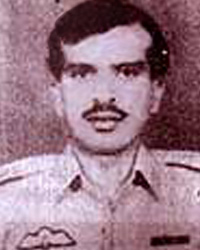
Abu Taher
()
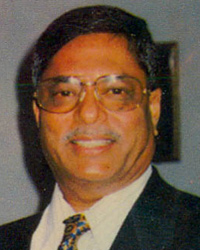
Muhammad (M.) Hamidullah Khan
(11 Sept 1938 - 30 Dec 2011)
Sector 11 (Mymensingh) Commander during 1971 Sangram. Air Force officer, politician, and writer. Born in Medinimandal village, Lauhajang upazila, Munshiganj district. Parents Muhammad Dabiruddin Khan, a Forest Ranger in the British Imperial Forest Service, and Jasimunnesa. Second of 9 children (1 died at infancy). Early education at places of posting of his father (e.g. Assam, Rangamati, and Bikrampur). Graduated in Commerce from Jagannath College, Dhaka (1959). Was finalising to study law, but opted to join Pakistan Air Force at Risalpur as a Flight Cadet. Commissioned as a Pilot Officer in June 1962. Served in various PAF bases. Last assignment in PAF was as Assistant Provost Marshal and Commanding Officer with additional responsibility as Director of Security, Tejgaon International Airport, Dhaka in late 1970. Appointed as commander of Mainkarchar sub-sector of Sector 11 then Sector Commander (9 Nov 1971) during 1971 Sangram. Promoted to Squadron Leader by government-in-exile and continued post in independent Bangladesh. Retired early 1978 as Wing Commander. Joined politics that same year as an activist of Bangladesh Nationalist Party (BNP). Elected member of Jatiya Sangsad in 1979, 1991, and 1996 from Munshiganj-2 constituency as BNP candidate BNP. Left briefly to join Awami League but returned to BNP a year later. Contested Jatiya Sangsad election (2008) from Mirpur constituency in Dhaka but was defeated. Associated with various welfare organisations. Chairman of Bangladesh Post Graduate Medical Research Centre (1979 - 1982), Bangladesh Muktijuddha Welfare Trust (1993 - 1996), and Janata Bank (1995 - 1996). Founded a girls' college at his native village. Wrote and contributed to number of articles to journals and newspapers, especially on Liberation War. Published two Bangla books 'Ekattare Uttar Ranangan' (The Northern Front 1971) and 'Bangalir Swadhinater Patabhumi'. Awarded 'Bir Pratik'. Died in Combined Military Hospital, Dhaka on 30 December 2011 aged 73. Left behind wife Rabeya Sultana Khan and two sons Murad Hamid Khan (Sonny) and Tariq Hamid Khan (Konny). Road No. 23 of Banani area in Dhaka renamed 'Hamidullah Khan Sarak' in his honour.
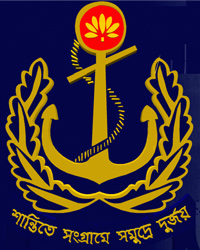
Bangladesh Navy ('Nu-bahini')
(Born July 1971)
Formed during 1971 Muktijudhho. Initially, there were 2 ships and 45 navy personnel. On 9 November 1971, the first naval fleet consisting of six small patrol vessels were inaugurated. Headquarters at Banani, Dhaka, and consist of 4 branches: Operations, Personnel, Material, and Logistics. Each branch headed by officers titled Principal Staff Officer (PSO) and known as Assistant Chief of Naval Staff (ACNS). Under each PSO there are various Directorates headed by Directors with the rank of Captain. Under each Director there are Deputy Directors (DD) and Staff Officers (SO). Official website is www.bangladeshnavy.org.
I found the [Bengali] formation commanders had a good knowledge of the local topography and a fair idea of the deployment of Pakistani forces and their fighting potential. They had a reasonable measure of the tasks in hand and were confident of success, provided some latitude was allowed to them in planning and the conduct of battle. In one voice, they disdained "spoonfeeding" from the top.
